Welcome to the page about the Lancaster Red Rose Amateur Operatic and Dramatic Society shows from 1970 to 1979. Below is information about the musicals the society staged in the 1970’s which include: Oklahoma! (1970); Annie Get Your Gun (1971); White Horse Inn (1972); The Boy Friend (1973); The Student Prince (1974); Show Boat (1975); The Quaker Girl (1976); Rio Rita (1977); Charlie Girl (1978); New Moon (1979).
There are also pages for the Red Rose AODS shows from … 1930’s … 1940’s … 1950’s … 1960’s … 1970’s … 1980’s … 1990’s … 2000’s … 2010’s … 2020’s … back to Lancaster Red Rose AODS.
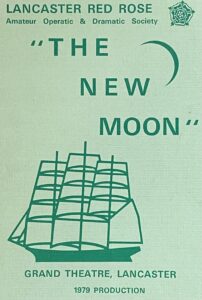 1979: The New Moon
1979: The New Moon
The 1979 production of ‘The New Moon’ was Lancaster Red Rose Amateur Operatic and Dramatic Society’s annual show which was staged at The Grand Theatre Lancaster.
The 1927 operetta – with music by by Sigmund Romberg; and lyrics and book by Oscar Hammerstein II, Frank Mandel, and Laurence Schwab – is written in the style of Viennese operetta.
Set in 1792, shortly before the French Revolution, it tells the story of a young French aristocrat in disguise, who has fled his country and falls in love with the daughter of a prominent New Orleans planter.
Musical numbers include: Dainty Wisp of a Thistledown; Marianne; The Girl on The Prow; Gorgeous Alexander; An Interrupted Love Son; Tavern Song; Softly, as in a Morning Sunrise; Stout-hearted Men; Fair Rosita; One Kiss; Ladies of the Jury; Wanting You; A Chanty; Funny Little Sailor Man; Lover, Come Back to Me; Love Is Quite a Simple Thing; Try Her Out at Dances; Never.
More production details to follow.
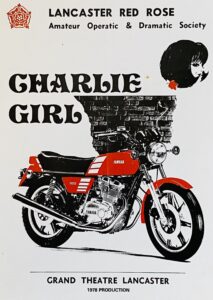 1978: Charlie Girl
1978: Charlie Girl
The 1978 production of ‘Charlie Girl’ was Lancaster Red Rose Amateur Operatic and Dramatic Society’s annual show which was staged at The Grand Theatre Lancaster.
The 1965 musical comedy – with music and lyrics by David Heneker and John Taylor; and book by Hugh Williams Margaret Vyner Williams and Ray Cooney – was conceived by Ross Taylor.
It premiered at the London’s West End Adelphi Theatre in December 1965 and became one of the most successful theatre shows of the day.
It tells the story of Lady Hadwell (the widow of an aristocrat) who is struggling to make ends meet by opening her home to the public. Her loyal assistant Joe, is in love with her youngest tomboy daughter Charlotte [‘Charlie’]. When Joe learns he’s won a fortune on the football pools, he conceals the fact from Lady Hadwell. In the meantime, Lady Hadwell is hoping for an engagement between Charlie and an American millionaire and in a comical moment, Charlie has to return her hired evening gown, and the rest of the guests at the ball also decide to cavort in their underwear.
Musical numbers include: Bells Will Ring; What Would I Get From Being Married; I Love Him, I Love Him; What’s the Magic; Let’s Do a Deal; My Favourite Occupation; I Was Young; Party of a Lifetime; I ‘ates Money; Charlie Girl Waltz; Like Love; That’s It; Fish and Chips; You Never Know What You Can Do Until You Try It; Charlie Girl.
More production details to follow.
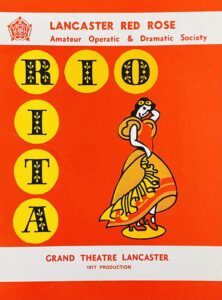 1977: Rio Rita
1977: Rio Rita
1977 saw Lancaster Red Rose AODS do the show ‘Rio Rita’ which was staged at The Grand Theatre, Lancaster.
The 1927 musical has music by Harry Tierney; lyrics by Joseph McCarthy; and book by Guy Bolton and Fred Thompson.
It premiered on Broadway in 1927 at the new Ziegfeld Theatre (Florenz Ziegfeld produced the show) and moved to the Lyric Theatre and Majestic Theatre (both on Broadway). It then premiered in London’s West End in 1930 at the [then] newly opened Prince Edward Theatre.
Set in Mexico and Texas, it tells the story of Jim Stewart who aims to catch the notorious local bandit known as ‘Kinkajou’ by disguising himself as a Mexican. Once in Mexico, he falls for local girl Rita, whose brother (Roberto) could be the criminal Jim’s looking for.
Musical numbers include: The world loves a lover, they say; The Best little lover in Town; Sweetheart; River Song (“Down By the River of My Dreams”); Eight Little Gringos; Are You There?; Rio Rita; Rangers’ chorus; March of the rangers; Spanish Shawl; The Kinkajou; You’re Always In My Arms; If You’re in Love, you’ll Waltz; Moonlight ballet; Out on the Loose; Yo Ho and a Bottle of Rum; The Black and White Ballet; Come, take a Trip; I can Speak Espagnol; Roses; Following the Sun Around.
More production details to follow.
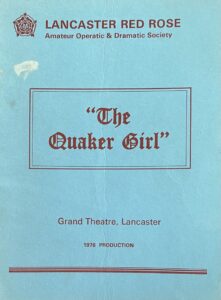 1976: The Quaker Girl
1976: The Quaker Girl
1976 saw Lancaster Red Rose AODS do the show ‘The Quaker Girl’ which was staged at The Grand Theatre, Lancaster.
This was the third time the society had done the show as it had previously done the show in 1950 and 1962.
The 1910 musical comedy – in three acts – has music by Lionel Monckton; lyrics by Adrian Ross and Percy Greenbank; and book by James T. Tanner. It tells the story of contrasts between dour Quaker morality and Parisienne high fashion. Prudence is thrown out of her house by her quaker parents for drinking a glass of champagne. Later, in Paris, her simple grey dress and bonnet become the height of fashion. The musical opened in the London’s West End at the Adelphi Theatre in 1910 before opening at the Park Theatre on Broadway in 1911.
Musical numbers include: We’ve such a tale to tell; While our worthy village neighbours; Wonderful (O, Time, Time); A Runaway Match; A Quaker Girl; A bad boy and a good girl; Tip-Toe; Just As Father Used to Do; In this Abode (Fashion So Soon Dethrones); Or Thereabouts!; On Revient de Chantilly; Ah Oui and The Little Grey Bonnet; Come to the Ball; A Dancing Lesson; Barbizon; When We Are Rich; A Wilderness and Thou; Tony, from America; Something to Tell; The First Dance.
More production details to follow.
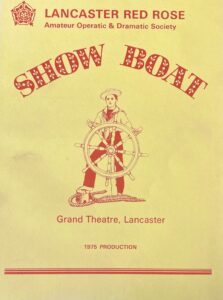 1975: Show Boat
1975: Show Boat
The 1975 production of ‘Show Boat’ was Lancaster Red Rose Amateur Operatic and Dramatic Society’s annual show which was staged at The Grand Theatre Lancaster.
The 1927 musical comedy – with music by Jerome Kern; lyrics and book by Oscar Hammerstein II – is based on the novel ‘Show Boat’ by Edna Ferber.
It tells the story of three generations of performers travelling from the Mississippi River to Chicago, and ultimately, Broadway. It follows the Hawkes family, including the captain’s naive daughter Magnolia, who wants to be a performer, as she marries a gambler and moves with him to Chicago. When his debts compound, he deserts her and their young daughter. Magnolia’s selfless best friend Julie, a performer on the Cotton Blossom, faces arrest on charges of miscegenation, which is illegal, and she spirals into despair. The passing of time reunites Magnolia and her now-grown daughter with Magnolia’s estranged husband, who returns offering a second chance at familial happiness.
Musical numbers include: Cotton Blossom; Where’s the Mate for Me?; Make Believe; Ol’ Man River; Can’t Help Lovin’ Dat Man; Life Upon the Wicked Stage; Till Good Luck Comes My Way; I Might Fall Back on You; C’mon Folks; Olio Dance; You Are Love; At the Fair; Dandies on Parade; Why Do I Love You?; In Dahomey; Bill; Nuns’ Processional; Goodbye, My Lady Love; After the Ball; Hey, Feller.
More production details to follow.
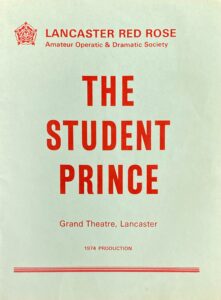 1974: The Student Prince
1974: The Student Prince
1974 saw Lancaster Red Rose AODS do the show ‘The Student Prince’ which was staged at the Grand Theatre, Lancaster.
This was the second time the society had done the show as it had previously done the show in 1958.
The 1924 operetta – with music by Sigmund Romberg; and lyrics and book by Dorothy Donnelly – is based on Wilhelm Meyer-Forster’s play Old Heidelberg and has a prologue and four acts.
It opened in December 1924 at Jolson’s 59th Street Theatre on Broadway and became the most successful of Romberg’s works.
It tells the story of Karl Franz (prince of the kingdom of Karlsberg) who childhood is engaged to Princess Margaret. His grandfather (the king) sends him to improve his social skills at University of Heidelberg. Karl and his cohort enjoy the local inn and student life; and he also falls in love with Kathie (the innkeeper’s niece) and the couple consider eloping. But when Karl learns that his grandfather is dying, he returns to Karlsberg to become the new king, and to honor the arranged marriage which neither he nor the princess wants.
Musical numbers include: Golden Days; Drinking Song; Deep in My Heart, Dear; Just We Two; Serenade (“Overhead the moon is beaming”).
More production details to follow.
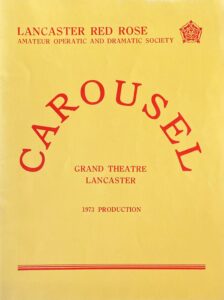 1973: Carousel
1973: Carousel
The 1973 production of Carousel was Lancaster Red Rose Amateur Operatic and Dramatic Society’s annual show which was staged at The Grand Theatre Lancaster.
The 1945 musical was the second by the team of Richard Rodgers (music) and Oscar Hammerstein II (lyrics and book) and was adapted from Ferenc Molnar’s 1909 play Liliom (changing Budapest for the Maine coastline).
It tells the story of Billy Bigelow, whose romance with millworker Julie Jordan comes at the price of both their jobs. He participates in a robbery to provide for Julie and their unborn child; after it goes tragically wrong, he is given a chance to make things right. A secondary plot line deals with millworker Carrie Pipperidge and her romance with ambitious fisherman Enoch Snow.
Famous musical numbers include: The Carousel Waltz; You’re a Queer One, Julie Jordan; (When I Marry) Mister Snow; If I Loved You; June Is Bustin’ Out All Over; When the Children Are Asleep; Blow High, Blow Low; Soliloquy; This Was a Real Nice Clambake; Geraniums in the Winder; There’s Nothin’ So Bad for a Woman; What’s the Use of Wond’rin’?; You’ll Never Walk Alone; The Highest Judge of All; Billy Makes a Journey.
More production details to follow.
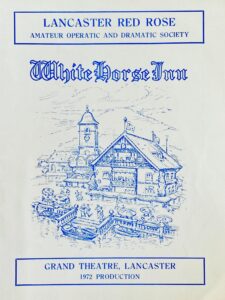 1972: The White Horse Inn
1972: The White Horse Inn
The 1970 production of ‘The White Horse Inn’ was Lancaster Red Rose Amateur Operatic and Dramatic Society’s annual show which was staged at The Grand Theatre Lancaster.
The 1931 musical comedy – with music by Ralph Benatsky and Robert Stolz; original lyrics by Robert Gilbert; english book and lyrics by Harry Grun; the whole adapted by Eric Maschwitz and Bernard Grun – was adapted by Hans Muller and Erik Charell from a play by Blumenthal and Kadelburg.
It tells the story of how the head waiters of the White Horse Inn have found that to fall in love with the attractive young widow who owns the establishment is a swift and certain route to dismissal. Yet none have been able to resist Josepha; least of all Leopold, the present head waiter. She, however, pines for Valentine Sutton, a regular visitor from England. Valentine’s annual visit is at hand, and by the same steamer arrive Ebenezer Grinkle, a self-made lad from Lancashire with plenty of brass, his sweet young daughter Ottoline, an impoverished Professor Hinzel and his gawky, lisping, but appealing daughter Gretel, and a dapper young man, Sigismund Smith. Sub-plots abound as Smith and Grinkle discover they are hated business rivals. Sutton (who is Smith’s solicitor) falls in love with Ottoline, and Smith with Gretel, while Leopold repeatedly threatens to resign and wish them all a last “Good-bye!” The subsequent arrival of His Imperial Majesty the Emperor serves at first only to add to the acrimonious chaos, but finally his kindly understanding and wisdom do much to bring about the statutory happy ending.
Musical numbers include: Yodel Song; O’er Valley and Hill; Touring Number; Entrance of Tourists; It Would Be Wonderful; Entrance of Steamer; White Horse Inn; Happy Cows; Spade Number; Your Eyes; Good-Bye; You Too; Salzkammergut; Bathing; Fairies; Alpine Number; Why Should We Cry for the Moon; Softly; In This Fickle World; On the Trail; My Song of Love.
More production details to follow.
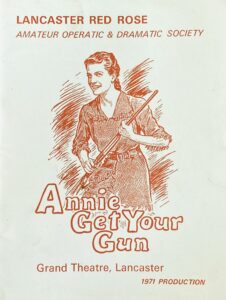 1971: Annie Get Your Gun
1971: Annie Get Your Gun
The 1971 production of ‘Annie Get Your Gun’ was Lancaster Red Rose Amateur Operatic and Dramatic Society’s annual show staged at The Grand Theatre Lancaster.
This 1946 musical has music and lyrics by Irving Berlin and a book by Dorothy Fields and Herbert Fields.
It tells the story of Annie Oakley [1860–1926], a sharpshooter who starred in Buffalo Bill’s Wild West, and her romance with fellow sharpshooter Frank E. Butler [1847–1926].
Musical numbers include: “The Girl That I Marry; They Say It’s Wonderful; You Can’t Get a Man with a Gun; There’s No Business Like Show Business; and Anything You Can Do.
.
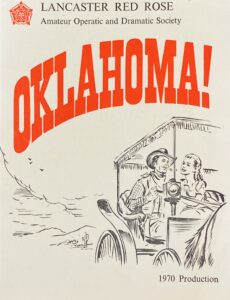 1970: Oklahoma!
1970: Oklahoma!
1970: Oklahoma
The 1970 production of ‘Oklahoma!’ was Lancaster Red Rose Amateur Operatic and Dramatic Society’s annual show which was staged at The Grand Theatre Lancaster.
The 1943 musical Oklahoma! was the first musical written by Rodgers and Hammerstein and is based on Lynn Riggs’ 1931 play, Green Grow the Lilacs.
Musical numbers include: Oh, What a Beautiful Mornin; The Surrey with the Fringe on Top; People Will Say We’re in Love; The Farmer and the Cowman; and of course, Oklahoma.
More production details to follow.
…
Quick links to Lancaster Red Rose AODS shows of the … 1930’s … 1940’s … 1950’s … 1960’s … 1970’s … 1980’s … 1990’s … 2000’s … 2010’s … 2020’s.